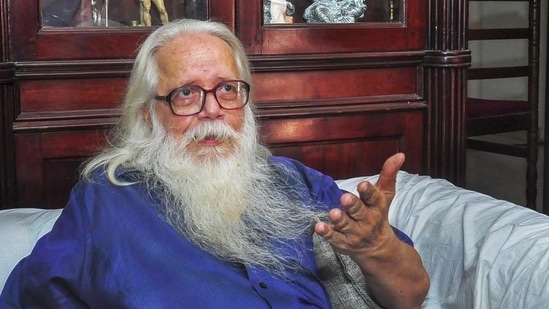CBI must probe ISRO spy case independently: SC
The Court was referring to the report prepared by a three-member Committee headed by former Supreme Court judge Justice (Retd) DK Jain which had named the police officials responsible for foisting a false case against Narayanan.
The Supreme Court on Monday said that the Central Bureau of Investigation (CBI) will have to conduct its investigation independently into the conspiracy by Kerala Police officials to frame former Indian Space Research Organization (ISRO) scientist S Nambi Narayanan in the alleged 1994 ISRO spy scandal and that the agency cannot just rely on the findings of the committee headed by a retired Supreme Court judge.

The Court was referring to the report prepared by a three-member Committee headed by former Supreme Court judge Justice (Retd) DK Jain which had named the police officials responsible for foisting a false case against Narayanan. Based on this report, the Court had directed CBI to take up the probe in April this year and had asked the agency to examine if a case was made out from the reading of the Committee’s findings.
On Monday, the CBI represented by Solicitor General Tushar Mehta informed the top court that the agency has decided to lodge a first information report (FIR). The bench of Justices AM Khanwilkar and Sanjiv Khanna allowed the agency to proceed in accordance with law and said, “Investigation agency must collect materials on its own. The report (by Justice DK Jain Committee) by itself cannot be the basis to proceed against the persons named as accused in the FIR. It is only to provide you initial information. Ultimately it is the investigation done by you that will have the consequence.”
The Committee, formed by the top court on September 14, 2018 had done an exhaustive analysis into the conspiracy charge leveled by Narayanan in his petition before the Supreme Court. Finding merit in his allegation that he was framed by officers of the Special Investigation Team (SIT) of the Kerala Police in the alleged scam, the top court ordered the probe and directed the Kerala government to pay a compensation of ₹50 lakh to the 81-year old scientist. The Committee had one representative each from Central and Kerala governments and the expenses of the Committee were borne by Centre.
The SIT formed in November 1994 was headed by then Deputy Inspector General of Police (Crime) Siby Mathews, along with investigating officers e investigating officers S. Vijayan (then Inspector, Special Branch) and KK Joshua, (then Deputy Superintendent of Police, CB CID).
With the report taken to its logical end, the bench found no purpose in continuing with it further and ordered the Committee to be wound up. Solicitor General informed the Court that on April 15 this year, when the Court directed CBI to examine the Justice DK Jain Committee report, a bar was placed on disclosing the report contents. Since some portions of the report were contained in the FIR, Mehta sought a clarification on making the FIR contents public.
The lawyers representing the police officers sought for a copy of the Committee report. The bench clarified that the report was meant for the purposes of the Court and the accused can certainly be provided the copy of the FIR by CBI. The bench allowed CBI to upload the FIR on its website without passing any specific directions in this regard. Mehta informed the Court that the same would be done during the course of the day.
Interestingly, this is not the first time the CBI is handling the ISRO spy scandal case. In December 1994, the Kerala government had handed over the case probe to CBI after SIT had arrested Nambi Narayanan and another scientist D Sasikumaran for the charge of passing secret documents related to ISRO to a Maldivian woman. The CBI in its final report found the allegations to be false. This finding led to the discharge of the two scientists by the trial court in May 1996.
The state government was unhappy with these findings and ordered the state police to re-investigate the case. This notification of June 27, 1996 was challenged by Narayanan before the Kerala High Court. In November 1996, the High Court upheld the state notification which forced Narayanan to approach the top court. This appeal was decided in September 2018.
Commenting on the trauma faced by Narayanan, the top court in its order had said, “The dignity of a person gets shocked when psycho-pathological treatment is meted out to him. A human being cries for justice when he feels that the insensible act has crucified his self-respect.”
In 2001, the National Human Rights Commission awarded him a compensation of ₹10 lakh. Narayanan had told the top court that the malicious prosecution had a “catastrophic effect on his service career” that destroyed his career, life span, savings, honour, academic work as well as self-esteem. The peace of his family was affected. Despite all odds, Narayanan kept fighting to be redeemed of the ignominy facing him of being accused of espionage.






